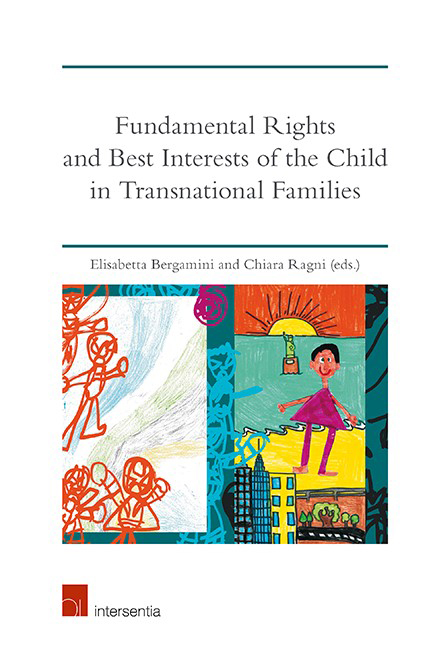Book contents
- Frontmatter
- Dedication
- Preface
- Acknowledgements
- Contents
- List of Cases
- List of Authors
- PART I THE IMPACT OF HUMAN RIGHTS AND OF THE BEST INTERESTS OF THE CHILD ON EU FREE MOVEMENT AND MIGRATION LAW
- PART II THE BEST INTERESTS OF THE CHILD AS A CONCERN OF HUMAN RIGHTS AND EUROPEAN PRIVATE INTERNATIONAL LAW
- The Place of Human Rights in the Private International Law of the Union in Family Matters
- The Best Interests of the Child Principle at the Intersection of Private International Law and Human Rights
- Recognition of a Foreign Status Filii: Pursuing the Best Interests Principle
- Surrogacy Arrangements and the Best Interests of the Child: The Case Law of the European Court of Human Rights
- Cross-Border Recognition of Adoption: Rethinking Private International Law from a Human Rights Perspective
- Protecting Children's Rights aft er Child Abduction: The Interaction of the CJEU and ECtHR in Interpreting Brussels II bis
- Cross-Border Parental Child Abduction in the EU: Is there Room for a Human Rights Exception?
- Impact of the Best Interests of the Child on the Brussels II ter Regulation
- Provisional Measures and the Best Interests of the Child in the Field of Parental Responsibility
- Index
- About the Editors
Cross-Border Recognition of Adoption: Rethinking Private International Law from a Human Rights Perspective
from PART II - THE BEST INTERESTS OF THE CHILD AS A CONCERN OF HUMAN RIGHTS AND EUROPEAN PRIVATE INTERNATIONAL LAW
Published online by Cambridge University Press: 12 November 2019
- Frontmatter
- Dedication
- Preface
- Acknowledgements
- Contents
- List of Cases
- List of Authors
- PART I THE IMPACT OF HUMAN RIGHTS AND OF THE BEST INTERESTS OF THE CHILD ON EU FREE MOVEMENT AND MIGRATION LAW
- PART II THE BEST INTERESTS OF THE CHILD AS A CONCERN OF HUMAN RIGHTS AND EUROPEAN PRIVATE INTERNATIONAL LAW
- The Place of Human Rights in the Private International Law of the Union in Family Matters
- The Best Interests of the Child Principle at the Intersection of Private International Law and Human Rights
- Recognition of a Foreign Status Filii: Pursuing the Best Interests Principle
- Surrogacy Arrangements and the Best Interests of the Child: The Case Law of the European Court of Human Rights
- Cross-Border Recognition of Adoption: Rethinking Private International Law from a Human Rights Perspective
- Protecting Children's Rights aft er Child Abduction: The Interaction of the CJEU and ECtHR in Interpreting Brussels II bis
- Cross-Border Parental Child Abduction in the EU: Is there Room for a Human Rights Exception?
- Impact of the Best Interests of the Child on the Brussels II ter Regulation
- Provisional Measures and the Best Interests of the Child in the Field of Parental Responsibility
- Index
- About the Editors
Summary
LACK OF HARMONISATION OF FAMILY LAW IN EUROPE AND ITS IMPACT ON RECOGNITION OF FOREIGN ADOPTIONS
The practice of adoption was largely viewed as a strictly national procedure for a long time, and as such, it was regulated by domestic rules. The international dimensions of this phenomenon have emerged as a relatively recent occurrence. These include both the movement of children across international borders for adoption and the possibility of obtaining the recognition of status filiation is duly acquired abroad through adoption. As we will see, notwithstanding their crossborder implications, these matters are only partly covered by international rules. Questions regarding issues such as the criteria that prospective parents should meet to be eligible for adoption or the legal effects of adoption are still mostly regulated by domestic legislation; States remain in fact reluctant to refrain from exercising their exclusive jurisdiction in family matters.
Even in the EU context, notwithstanding the entry into force of an increasing number of rules defining key aspects of jurisdiction, applicable law and recognition and the enforcement of judgments in the fields of divorce, maintenance obligations, parental responsibility, among others, substantive aspects of family law are still regulated by national legislation. The failure to pass uniform rules on family issues demonstrates the cautious attitude of States in this regard.
For example, the limited number of ratifications alleged to the 1967 European Convention on the Adoption of Children, and even fewer to the revised version of the treaty, which was adopted in 2008 to account for legal and social developments in the European framework, can be read as proof of the aforementioned reluctance of States to cede their exclusive jurisdiction in family matters. This approach is due to the continuing influence on family law of moral, religious or political beliefs, which oft en vary across States.
Against this background, cross-border recognition of the parental status arising from foreign adoptions has encountered obstacles. In some cases, orders duly entered into in one country may be considered contrary to the public policy of another country (such as in the case of adoptions pronounced in favour of same-sex couples). In others such orders may be recognised with different – and generally more limited – effects than those produced in the country of origin (as in the case of single adoption).
- Type
- Chapter
- Information
- Publisher: IntersentiaPrint publication year: 2019
- 1
- Cited by



